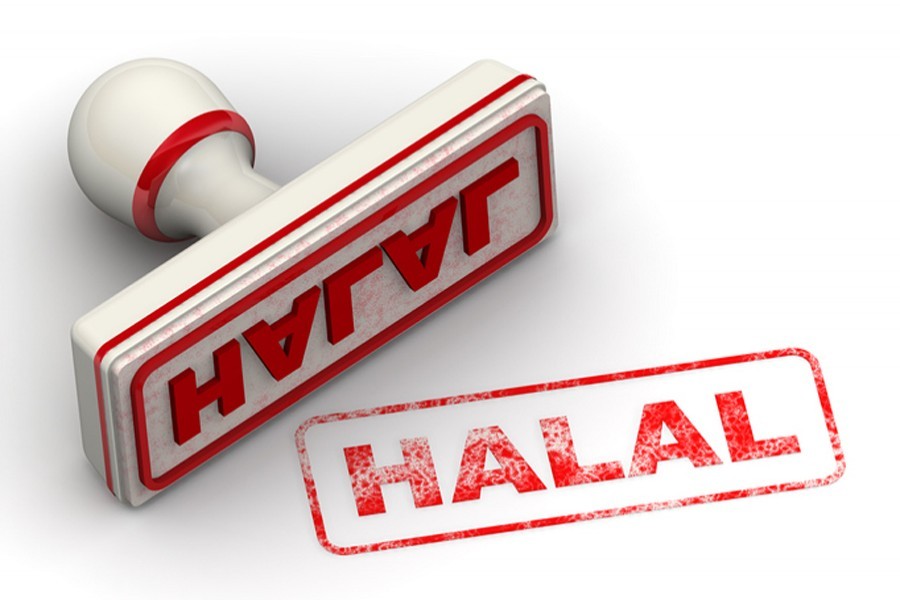
Published :
Updated :

The formulation of the halal certification policy for specific export products, particularly meat, has addressed a longstanding demand from exporters. Businesses engaged in the marketing of domestically consumed and export-bound halal products will now be required to obtain certification and display the associated logo. The Bangladesh Islamic Foundation has been named the designated authority for issuing the certification, marking a significant step towards promoting halal products and enabling local producers to access international markets.
The certification covers various product categories, including food items, processed foods, pharmaceuticals, and cosmetics. Reports indicate that the certification is valid for one year. In the pharmaceutical sector, herbal, Unani, and Ayurvedic medicines are also eligible for the certification. Life-saving drugs are deemed halal, with a provision for allowing drug makers to use up to 0.5 per cent alcohol as a carrier or for ensuring the quality of the medicine. The policy further prohibits use of fat or any other portion of prohibited animals in cosmetics such as soap, shampoo, toothpaste, and perfumes.
For sometime, the untapped potential of exporting halal food, especially meat, has been evident due to unmet compliance protocols in target markets. The key compliance requirement for exporting food products to those markets, including meat, is halal certification from a government-designated body--- a crucial aspect not only for Muslim countries but also for other markets.
Recent reports on imported meat, particularly beef, has prompted a strong reaction from many who consider the country self-sufficient in beef production and hence instead of importing --- that too from far flung regions in Africa and Latin America --- there should be a coordinated move to create facilities for export.
In fact, Bangladesh does export meat (including beef) to some select markets in the Middle East in small quantities. According to knowledgeable quarters, exports could have been increased manifold given the ever-increasing global demand. However, there are stringent pre-export requirements such as fulfilling various compliance norms that pose problems for export. These among others include halal certification in export of meat and food products made from meat. With the policy now ready to be implemented soon, it is hoped that a major barrier to export of these products will be gone.
Global industry value of halal food was projected to be around US$ 3.0 trillion by 2023 which was about $ 1.9 trillion in 2015, according to the Global Islamic Economy Report 2016-2017. Growth regions, besides the Middle Eastern and Gulf countries, include Indonesia and Turkey. The European Union market for halal food that predominantly includes meat, has an estimated annual growth of around 15 per cent and is worth an estimated US$35 billion. Halal ready foods represent a growing consumer market for Muslims and non-Muslims alike in Britain and America and are offered by an increasing number of retailers. In such a context, export from Bangladesh is, sadly, too small.
Considering the hygiene of cattle slaughter, the market of halal meat is growing fast, not confined to the needs of Muslim consumers. In a situation like this, it was expected that halal meat would steadily emerge as a product to reckon with in Bangladesh's export basket. This has not happened,
Media reports say Bangladesh lost a sizeable market share of halal meat in the Middle Eastern countries --- one of the major markets of the product, as it is yet to comply with the conditions set for export. It has been gathered that the Saudi Arabian government was willing to procure considerable volumes of raw and processed meat from Bangladesh, but a lack of compliance with protocols such as halal certification and maintenance of standard and hygiene of meat came up as the major impediment.
Now that the certification aspect has been addressed, at least in terms of designating the responsible body, it remains to be seen whether the designated body-the Bangladesh Islamic Foundation- can accomplish the job on its own. Issuing the certificate involves addressing standard and hygiene-related issues, requiring specialised expertise. Certification is intricately linked to ensuring disease-free cattle rearing and adherence to processes from rearing to slaughtering and packaging for export. Establishing the designated government body thus involves leveraging technology and expertise, aligning with practices in other exporting countries. This is to say, naming the designated body is not all. The authorities will have to do the needful following issuance of certificates.
However, with the policy set to be implemented, it is clear that the need for strategic planning and execution is paramount. Success of the policy hinges on effective implementation, continuous evaluation, and adaptability to evolving industry standards. This also includes fostering collaborations with international entities that have successfully implemented similar certification processes, thereby leveraging best practices. Additionally, transparent communication channels should be established to disseminate information about the certification process, its benefits for both local producers and international consumers, and the standards being upheld. This approach not only fosters trust but also positions Bangladesh as a reliable source of quality halal products.
wasiahmed.bd@gmail.com


 For all latest news, follow The Financial Express Google News channel.
For all latest news, follow The Financial Express Google News channel.